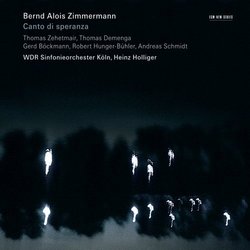Two superb string concertos and a grim oratorio
R. Hutchinson | a world ruled by fossil fuels and fossil minds | 05/30/2009
(5 out of 5 stars)
"Bernd Alois Zimmerman (1918 -- 1970) was a leading figure in Germany's post-war avant-garde, best known for his 1965 serialist opera DIE SOLDATEN, which was recently staged in NYC. This ECM disc is a superb set of lesser known Zimmerman works, featuring some of today's leading German musicians, with Heinz Holliger leading the WDR Sinfonieorchester Koln.
The brilliant Thomas Zehetmair performs the "Concerto for Violin and Orchestra" (19'03 -- 1950), a very dynamic three-movement work in the idiom of Hindemith, Bartok and Stravinsky. It was an immediate success upon its premiere in December 1950, and helped establish Zimmerman's reputation. The Violin Concerto includes jazz and blues elements which Zimmerman would continue to draw on throughout his life. He started with a violin and piano sonata, and reworked it into the concerto on commission from Southwest German Radio. The central "Fantasia" movement includes a long twelve-tone section, bookended by quotes from the ancient Dies irae melody, and culminates in a passage that sounds quite like Shostakovich.
Thomas Demenga performs the "Canto di speranza (Song of Hope) -- Cantata for Cello and Orchestra (17'47 -- 1952/1957), a very different piece, mysterious and introspective. It is written entirely in twelve-tone language, moving toward serialism in which not only pitch but duration, dynamics and intensities are governed by the same series. While this might sound intimidating, it is an enchanting piece. I am confident that most open-eared music listeners will enjoy both of these concertos.
The longest work has the longest name as well -- "Ich wandte mich und sah an alles Unrecht, das geschah unter der Sonne" -- Ecclesiastical Action for two speakers, bass solo and orchestra (36'37 -- 1970). It is sung by Andreas Schmidt. Translated into English, the title can be rendered "And turning then, I saw there great injustice that is done under the heavens." The text is taken from the Ecclesiastes 4: 1-10 and Dostoevsky's infamous Grand Inquisitor passage from The Brothers Karamazov, and the 28-page booklet contains the complete text. It was the last thing Zimmerman wrote before committing suicide on August 10, 1970, and it is certainly not filled with hope. The piece concludes with some dramatic tragi-comic stage action which is largely lost on CD, but is suggestive nonetheless. (An earlier recording can be found in Box 12 of the Musik in Deutschland 1950-2000 series on RCA -- Vocal Music with Orchestra).
Zimmerman was, according to Michael Struck-Schloen's fine liner notes, Rhenish Catholic -- "Rhenish Catholicism combined rank sensuality and ascetic rigor, rebellion against every injustice and a canon of Christian values that culminated in humanism and solidarity with the weak and humiliated." Zimmerman served in the war, in Poland, France and Russia, and it is entirely possible that the dissonance between his beliefs and his wartime actions and experiences is what finally led him to take his life at age 52.
In all honesty, I do not think I will listen to the oratorio very often, though I have come to appreciate vocal classical music more now than I did several years ago. But the string concertos are both excellent (there is at least one other recording of the Violin Concerto , live with Eotvos leading the Bavarian Radio Symphony Orchestra in the Musica Viva series), and this disc overall is a fine tribute to an important and esteemed figure in late 20th century music.
"


 Track Listings (3) - Disc #1
Track Listings (3) - Disc #1